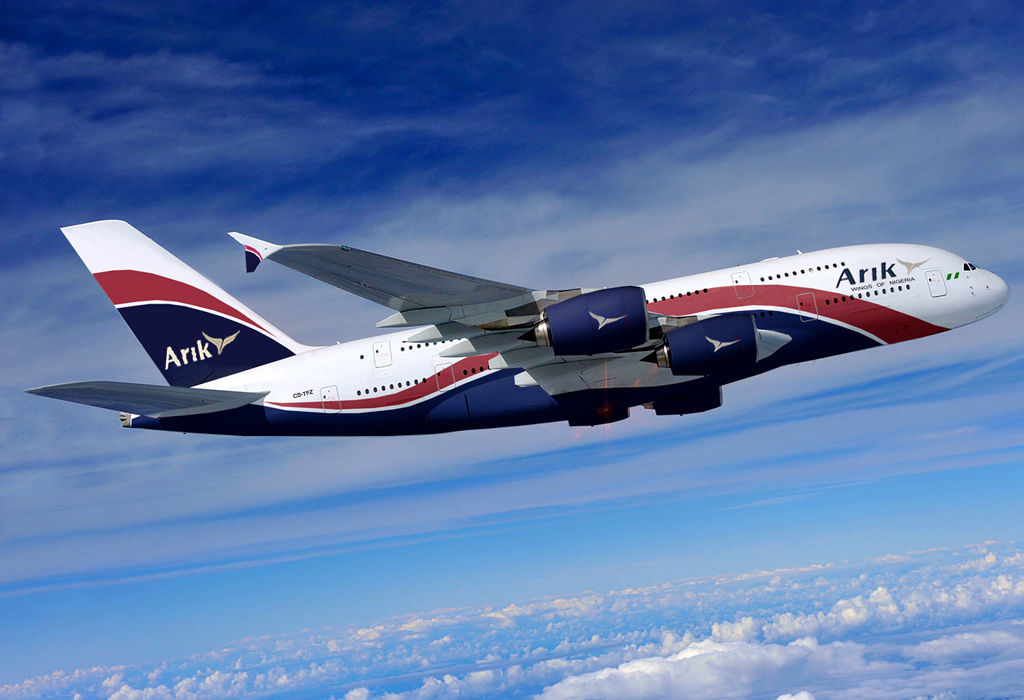- Nigeria’s Aviation Sector Hits Turbulence
Nigeria may consider itself a regional aviation hub but years of mismanagement and now recession have blighted domestic airline operations, making delays and cancellations the norm.
Industry experts say the sector needs a fundamental overhaul, pointing to opaque management practices, rampant corruption and risks for passengers from security and dilapidated infrastructure.
Arik Air, which has a 60 percent share of domestic flights and is the country’s biggest private carrier, has found itself increasingly in the firing line of disgruntled passengers.
Earlier this month, irate passengers beat up one of its executives at Lagos international airport after the third consecutive cancellation of their flight to Johannesburg.
In December, Arik operations were grounded by a 24-hour strike by employees demanding the payment of seven months arrears in salary.
There was no response from Arik when asked to comment on the situation by AFP.
Other domestic operators are struggling. Aero Contractors, the second biggest carrier, stopped services for four months at the end of last year because of “serious financial difficulties”.
For John Ojikutu, an aviation security consultant, most Nigerian airlines run their businesses like a grocery store.
“They just want to make profit,” he told AFP.
The result is airlines in Nigeria generally have a short life span: in 35 years more than 40 operators have gone bust, including Nigeria Airways, which collapsed in 2003.
– Dollar shortage –
Ojikutu said the airlines are heavily in debt and “taking advantage” of the country.
“People are… operating without paying the fuel marketers, without paying their staff, without paying for the services they’re given (insurance, maintenance),” he said.
“If they are not making profit, the question is what do they really do with all this money?… They are selling tickets every day.
“As long as we don’t have a strong, credible, independent regulatory agency we cannot have a viable aviation industry in this country.”
In their defence, the airlines blame a lack of foreign currency that has left them unable to pay fuel suppliers or, in some cases, landing charges at airports outside Nigeria.
Nigeria is one of Africa’s main oil producers but is forced to export crude and import petroleum products because of a lack of domestic refining capacity.
The fall in the price of crude on international markets has seen the naira currency lose value against the dollar and Nigerian banks no longer have enough liquidity.
Foreign airlines such as United and Iberia have stopped flights to Nigeria because of difficulties in repatriating profits in dollars.
In September last year, members of the House of Representatives asked the government to declare a state of emergency in the aviation sector, saying 160,000 jobs were at risk.
Lawmakers also called for an investigation into the alleged misappropriation of 120 billion naira (357 million euros) of public funds in 2012 meant to modernise the sector.
– Airport closure –
Two years ago, the Nigerian state got on the board of several airlines, including Arik and Aero, through its Asset Management Corporation of Nigeria.
But according to Ojikutu, no serious audit has been carried out to evaluate the real financial situation of the companies.
“Funders and banks may have been too lenient in granting credit to Nigerian airlines for excessive expansion on the basis that somehow government (or AMCON) will step in to protect banks from failing due to non-performing loans to airlines,” added Joachim Vermooten, an expert in transport economics at the University Johannesburg.
Another major challenge is upgrading ageing infrastructure which cannot handle the millions of passengers who now travel every day through Nigerian airports.
From early March for example, the airport in Abuja will close for six weeks for major resurfacing work on the only runway serving the federal capital.
The runway, which was built in 1982 with a life span of 20 years, is now “completely gone” and “unsafe for operation”, according to the aviation minister Hadi Sirika.
“The entire structure of the runway has failed,” he has said.
Passengers for Abuja will have to land at Kaduna, some 200 kilometres to the north, and transit to the capital by bus on a road known for frequent kidnappings.
The airport closure is the talk of Abuja, underlining not just Nigeria’s reliance on air transport but the lack of a viable alternative.
AFP

 Naira3 weeks ago
Naira3 weeks ago
 News4 weeks ago
News4 weeks ago
 Naira4 weeks ago
Naira4 weeks ago
 Naira3 weeks ago
Naira3 weeks ago
 Jobs3 weeks ago
Jobs3 weeks ago
 Travel3 weeks ago
Travel3 weeks ago
 Naira3 weeks ago
Naira3 weeks ago
 Investment4 weeks ago
Investment4 weeks ago






























